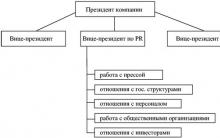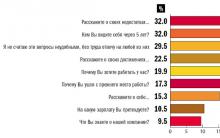The motive of expectation, which becomes more and more tense as the meeting approaches ("I anticipate you ..."), is combined with fear ("But I'm scared ..."), which gives the lyrical plot a special drama, which is emphasized by the repetition of the image-symbol "the entire horizon is on fire" , with the epithets "intolerable", "sorrowful", "low", contrasting with the words "clear", "effulgence". Passionately craving for the incarnation of the ideal, the lyrical hero is afraid to be disappointed, to be deceived, because, having acquired an earthly embodiment, the Beautiful Lady may turn out to be dissimilar to his ideas about her, and will lose her “ideality”, her divinity. So, next to the desire for a meeting, deep doubts arise about its feasibility, about the attainability of reuniting the earthly and heavenly.
Fire is a symbol of Spirit, God ... A symbol of the triumph of light and life over darkness and death, a symbol of universal purification.
But then Her appearance begins to double, for he himself is bifurcated.
Spiritually, he is a devout and pure monk, living in a monastery, praying in a church.
In the poem "I love tall cathedrals humbled soul to visit ", we read the confession: I'm afraid of my two-faced soul ... Thus, in" Poems "all the paths of Blok's further poetic wanderings began. In this book, “the great light and evil darkness” is the pinnacle of mystical ascent and dizziness over the abyss.
"I'm scared to meet with you ..."
I'm scared to meet you.
It is more terrible not to meet you.
I began to wonder at everything
I caught the seal on everything.
There are shadows in the street
I don’t understand whether they are living or sleeping.
Clung to the church steps,
I'm afraid to look back.
They put their hands on my shoulders
But I don't remember the names.
There are sounds in my ears
The recent big funeral.
And the gloomy sky is low -
The temple itself was also covered.
I know: You are here. You are close.
You are not here. Are you there.
There is no color symbolism in this poem. But in comparison with the first poems of the cycle, the "entry" of the real world into the world of the "Beautiful Lady" is especially clear.
The poem begins with a sharp antithesis: “I’m scared to meet with you // I’m afraid not to meet you,” and from the very first line the motive of fear begins to dominate in it. The figurative structure of this poem, one of the final stages of the cycle, is contrasted with the figurative structure of the poems "I enter dark temples ...", "I, a lad, light candles ...".
The color ("gloomy sky"), the sound (the sounds of the funeral) change, and although the subject line associated with the images of the temple remains, it receives an additional psychological coloration: instead of the "shining of red lamps" - "the gloomy sky lowered the temple itself." The line “You are here. You are close "expresses the hero's confidence in the existence of the ideal, but in the final line (" You are not here. You are there ") despair sounds, the feeling of the impossibility of the earthly embodiment of the Eternal Femininity. Brief phrases and the pauses that arise between them convey the ultimate excitement of the lyric hero. The lyrical plot is complicated by the appearance of shadows.
In other poems of the cycle, the hero's gaze was directed to unearthly space, to a higher reality. Here, for the first time, the still vague outlines of earthly reality appear, which interferes with the desired meeting. The poet's gaze turns more and more insistently to the world around him; as a result, doubts are growing about the possibility of an early incarnation of the romantic ideal. The hero is faced with a choice: to stay in the world of ideal illusions or plunge into the world of earthly elements.
This moment of choice is associated with the final first volume of the cycle with the expressive title "Crossroads".
Factory
The windows in the neighboring house are zsolty.
In the evenings - in the evenings
Brooding bolts creak
People are approaching the gate.
And the gates are deafly locked,
And on the wall - and on the wall
Immobile someone, black someone
He counts people in silence.
I can hear everything from my top:
Bend over exhausted backs
The people gathered below.
They will come in and scatter
Pile coolies on their backs,
And in the yellow windows they will laugh
That these beggars were led away.
If in "Poems about the Beautiful Lady" the poet's gaze was directed upward, to the church vault, to the sky, then in this poem he looks around himself ("In the next house ...") and even as if from top to bottom, peering into the features of earthly reality (" I hear everything from my summit "). This determined the change in the subject line (bolts, gates, coolies) and colors("Zsolty", "black someone"). The epithet "yellow", framing the poem, brings to the created picture an association of morbidity, unhealthy feverishness, and thanks to its unusual writing, the epithet takes on the meaning of a symbol of some sinister force. Another symbolic image is connected with the world of evil - “motionless someone, black someone”. This symbol should not be taken literally. Of course, one can imagine a terrible factory building, swallowing the incoming workers, but this picture does not exhaust the entire content of the image. Rather, it is a symbol of some kind of world, mystical evil.
Calling the victims of this evil people, people, beggars, Blok does not use the word "workers". In general, referring to social reality at the end of the first volume, the poet does not give social, realistic motivations to its phenomena.
The poem "Factory" can be viewed as a symbolic image of the collision of a suffering, deceived person with the power of evil that has reigned in the world.
The Crossroads cycle marks the turn of Blok from the ideal world of the Beautiful Lady to the world of earthly elements.
General conclusions
After analyzing the main poems of the cycle "Poems about the Beautiful Lady" in the context of color symbols used by Blok, I came to the conclusion that one of the main ways of expressing his views, for Blok, is color. With the help of a color palette, he conveys his opinion, his views, his understanding of a particular phenomenon, expresses his attitude.
Basically, the meaning of flowers in the context of poems coincides with the most frequent interpretations of these same colors. For example, the most often used white emphasizes the spiritual beauty, purity, innocence of the image of the Beautiful Lady, her divine origin, indicates her belonging to the other world, to which the author aspires, but can never achieve.
For Blok, red is associated with Divine love, with the warmth that he hopes to receive from his Beautiful Lady, i.e. with reciprocity. Red is also used by Blok to denote something secret, intimate, very personal, most likely it is associated with dreams and hopes regarding the possibility of meeting the girl of his dreams, with the possibility of combining earthly and heavenly images in one woman. And this is the most important question that Blok was interested in: will the image of the Beautiful Lady change? What will prevail in it - earthly or heavenly? Does this image have the right to exist in our cruel, dark, "terrible" world?
As one of the shades of red, Block often uses pink as the color of resurrection, the color of the flesh, i.e. something tangible, really existing.
I also came to the conclusion that Blok built the whole cycle on contrasts and contrasts. Colors and images, feelings are contrasted. This reflects the world of the Block at the time of the creation of this cycle, since in Blok there was a continuous struggle with itself. This is probably why this cycle is considered autobiographical notes, since everything that happened to Alexander Alexandrovich during the two years of the creation of the cycle was reflected in his poems. And every gesture of Lyudmila Dmitrievna Mendeleeva, her attitude, behavior - all this was reflected in the lyrics of that period.
It is to express this fear and uncertainty that Block uses blue color and its shades, each time shifting the balance to one of the worlds (the lighter shade is the overreal world, the more dark shade- the subreal world), thereby expressing their fears and feelings.
I'm scared to meet you.
It is more terrible not to meet you.
I began to wonder at everything
I caught the seal on everything.
Shadows walk down the street
I don’t understand whether they are living or sleeping.
Clung to the church steps,
I'm afraid to look back.
They put their hands on my shoulders
But I don't remember the names.
There are sounds in my ears
The recent big funeral.
And the gloomy sky is low -
The temple itself was also covered.
I know: You are here. You are close.
You are not here. Are you there.
Analysis of the poem "I'm afraid to meet with you" by Alexander Blok
The poem "I'm afraid to meet with you ..." was written by Blok in 1902 and was included in his debut collection of works. Characteristic feature is the poet's excessive passion for symbolism and admiration for the image of the Eternal Femininity.
V real life LD Mendeleeva became the embodiment of the ideal female image for Blok. The relationship between them was rather strange, sometimes just comical. Mendeleeva was an ordinary girl dreaming of true love. The bloc was completely at the mercy of images created in his own imagination. He considered his chosen one to be an unearthly creature, the laws of the real world should not apply to her. In fact, he forced Mendeleev to marry him, threatening to commit suicide. The poem "I am afraid to meet with you ..." is sustained in this spirit.
Any man in love, to some extent, worships his beloved woman. The block goes to the absolute extreme. The name itself contains an amazing statement: the fear of meeting your beloved. In the second line, with the help of an antithesis, the poet softens the phrase: “it’s worse not to meet you”.
The "love" work as a whole is rather unusual. It does not contain any indications, not only of the girl's physical appearance, but even of her inner world. This is explained by Blok's fascination with the philosophy of V. Solovyov, which he reworked in accordance with his innate mysticism. Until 1905, Blok completely abstracted himself from the physical world and did not recognize it. Everything around him was presented in the form of hazy symbols and images. The central part of the poem reflects these views: "shadows walk," "I do not remember names." Quite unexpectedly for a man in love, "sounds are heard ... of a great funeral." Even the sacred place near which the author is located is not connected in his mind with something bright. The temple is covered with a "gloomy sky".
This mystical mood of Blok is confirmed in the finale of the work with the help of yet another antithesis: “You are close. You are not here". Even taking into account that at this time Mendeleeva did not reciprocate Blok, the poem "I am afraid to meet with You ..." is far from love lyrics and makes a very heavy impression.
Alexander Blok's poem "I'm afraid to meet with you" is dedicated to his future wife (Lyubov Mendeleev) and was written in 1902, almost exactly one year before their wedding in Boblovo. In the lines, the great symbolist conveys the feelings that they experience in a relationship with their bride.
At this stage of the relationship, Blok has ambivalent feelings for Mendeleeva. This is clearly seen already from the first lines of the work:
It is more terrible not to meet you.
The reason for the fear
When meeting, at first, Blok felt ill at ease, but the separation frightened him even more. Probably, this is how real feelings should be born.
In the second quatrain, church steps enter the scene, symbolizing an attempt to ask God for advice. The author turns to God, asking what to do, what to do at this crossroads in life. The fear of looking back is also understandable - this is the fear of being alone, which surrounded the poet until recently.
The third quatrain is interesting, where the poet's "trademark" symbolism is clearly visible.
They put their hands on my shoulders
But I don't remember the names.
Relationship with Mendeleeva
Perhaps this is a memory of previous meetings with other ladies. Mendeleeva so covered them with herself that the author of the poems does not even remember the names of her former friends. They have been buried in their souls for a long time, and new relationships are sprouting in their cemetery. I must say that the new relationship will remain for life, Mendeleeva will be Blok's faithful friend, and will remain faithful to him even after the poet's death.
In the last column, the author returns to the topic of the beginning of the poem. In the beginning it was scary both with her and without her, in the end the heroine is simultaneously in the temple and outside it. Perhaps, by this, Blok shows the versatility of Love, the temple is a soul, outside of its physical joys and suffering. The heroine is both far from the author and close to him. This once again underlines the complexity of the relationship of this stage.
A beautiful example of Blok's early love lyrics, in which the hand of a master is already felt, capable of showing the depth of a relationship in a few lines.
I'm scared to meet you.
It is more terrible not to meet you.
I began to wonder at everything
I caught the seal on everything.
Shadows walk down the street
I don’t understand whether they are living or sleeping.
Clung to the church steps,
I'm afraid to look back.
They put their hands on my shoulders
But I don't remember the names.
There are sounds in my ears
The recent big funeral.
And the gloomy sky is low -
The temple itself was also covered.
I know: You are here. You are close.
You are not here. Are you there.
The famous Russian poet Alexander Alexandrovich Blok was born on November 16 in 1880 in the city of St. Petersburg. The mother of Alexander Alexandrovich Blok was named Alexandra Andreevna Beketova, the father of the future poet was called Alexander Lvovich Blok. Soon the mother of Alexander Blok went to another man, to the young officer Kublitsky-Piottukh, taking her son with her. The mother gave the surname and patronymic to her child from her first husband.
Childhood of Alexander Blok, took place on the outskirts of the city of St. Petersburg in the Grenadier barracks. Alexander Blok studied at the Vvedenskaya gymnasium, on vacation he left for Shakhmatovo, his grandfather's estate near Moscow.
At a very early age, Alexander Blok was fond of creativity, and in particular poetry. Alexander wrote his first poems at the age of five, and at the age of ten he had already published two issues of the magazine "Ship".
Alexander Alexandrovich Blok wrote his immortal poems mainly about his feelings and thoughts, which literally burst from the depths of his soul. Here is one of these poems, which is called "I'm afraid to meet with you."
I'm scared to meet you. It’s worse not to meet you. I began to wonder at everything, I caught the seal on everything. Apparently, in the first lines of the poem, the famous poet Alexander Alexandrovich Blok describes his feelings, from the action of which he is horrified, feeling that something was wrong. But initially it is not clear who the poem is talking about.
Further, the poet writes. Shadows walk along the street, I do not understand whether they live or sleep. Having clung to the church steps, I am afraid to look back. Based on these lines, it becomes clear that the poet describes a supernatural phenomenon, which he is terribly afraid of, and in order to protect himself from it, he turns to the church, not looking back, so as not to see what is happening.
Further, the poet explains. They put my hands on the stove, but I don't remember the names. The sounds of the recent big funeral are heard in my ears. From these lines it becomes clear that the poet describes the dead people who persecute him.
In the closing lines, the author writes. And the gloomy sky is low - even the temple itself is covered. I know: You are here. You are close. You are not here, you are there. In these lines, Blok describes the current situation, feeling the soul of a deceased person whom he apparently knew. He also has such sensations that a soul that has gone into another world is watching him from another world.
Alexander Alexandrovich Blok, passed away on August 7 in 1921 due to severe cardiovascular disease. Some eyewitnesses believed that the poet went crazy before his death, but this statement turned out to be false.
"I'm scared to meet with you ..." Alexander Blok
I'm scared to meet you.
It is not more terrible to greet you.
I began to wonder at everything
I caught the seal on everythingShadows walk down the street
I don’t understand - they live, or they sleep ...
Clung to the church steps,
I'm afraid to look back.They put their hands on my shoulders
But I don't remember the names.
There are sounds in my ears
The recent big funeral.And the gloomy sky is low -
The temple itself was also covered.
I know - You are here. You are close.
You are not here. Are you there.
Analysis of Blok's poem "I'm afraid to meet with you ..."
The Bloc's debut book "Poems about the Beautiful Lady", written in the period from 1901 to 1902 and sustained in the spirit of Symbolism, is dedicated to Lyubov Dmitrievna Mendeleeva. The poet met her back in childhood... Feelings arose much later - in the late 1890s. Their relationship was originally like a game. Mendeleeva either reciprocated her admirer or repulsed him. Alexander Alexandrovich perceived her as the personification of the Eternal Femininity, the Beautiful Lady. Worshiping her is one of the main themes of the aforementioned collection. Blok's courtship eventually bore fruit. In 1903 Mendeleeva married him.
The book includes a poem "I'm afraid to meet with you ..." dated December 5, 1902. The first two lines of the text are antithesis. On the one hand, it is scary for the lyrical hero to meet the object of his adoration. On the other hand, he is more afraid of the prospect of not seeing her. There are no specific signs in the work regarding the main female character. The poet does not describe her appearance or character. Moreover, all the pronouns "you" and its derivatives are written with a capital letter, which is typical for "Poems about the Beautiful Lady" and part of Blok's early love lyrics. From the opening lines of the text, the theme of fear becomes the key. The hero is afraid of meeting the Beautiful Lady, as this may entail a change in her spiritual nature. In the finale, he understands that he is not destined to see his beloved in earthly reality. She is in another dimension, although it seems incredibly close:
I know: You are here. You are close.
You are not here. Are you there.
In the poem "I am afraid to meet with you ..." there are no bright colors: shadows walk along the street, the gloomy sky is low. The poet paints a rather gloomy reality, into which even the mention of the temple does not bring light. His image in the work symbolizes a sacred place endowed with special power. But a big funeral was recently held in this church.
The lyrical hero is confident in the existence of an ideal, although in the finale of the work he realizes the impossibility of the earthly embodiment of the Eternal Femininity. Thus, the theme of the confrontation between reality and the world of beautiful illusions is revealed. The block puts the hero in front of a difficult choice - to surrender completely to earthly passions or continue to exist in an ideal dream space. In the poem under consideration, the answer is not given, the poet devotes a whole cycle to his search, which is called "Crossroads".











Energy drinks: give vigor, but take away health What will happen if you drink 4 energy drinks
Mustard for weight loss: how to use the seasoning with maximum benefit Is it possible for children to have mustard
The benefits and harms of mustard for the human body Table mustard benefits and harms
How to treat the ear after piercing: types of antiseptics, their composition, rules and features of the treatment of a pierced ear
Sistine Chapel in the Vatican: description, history, architectural features